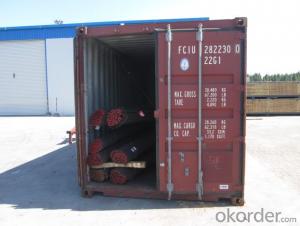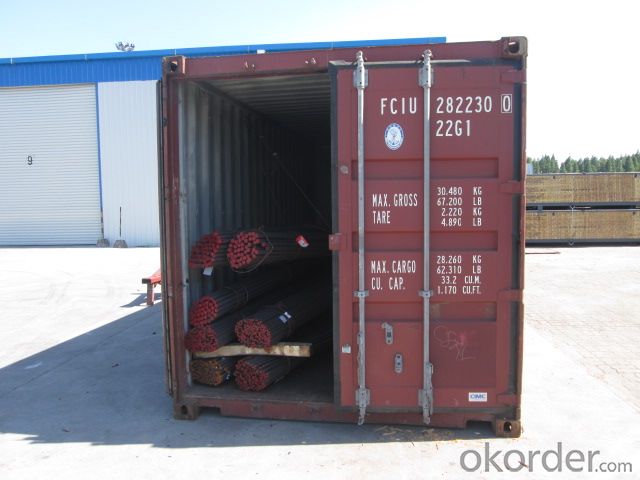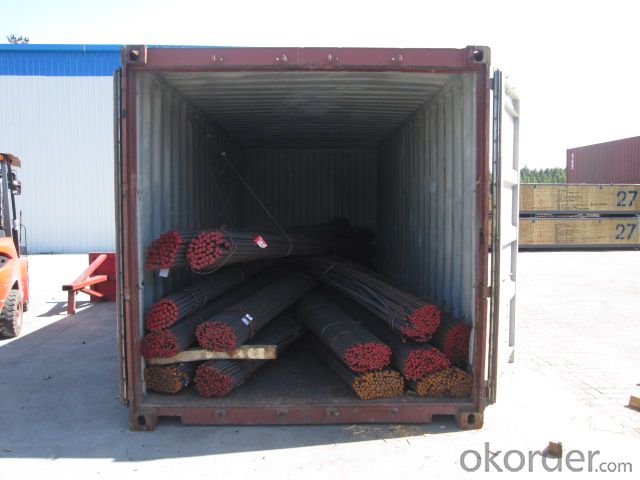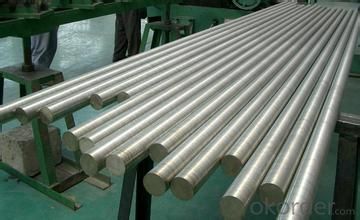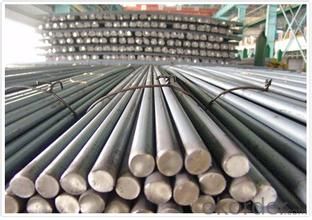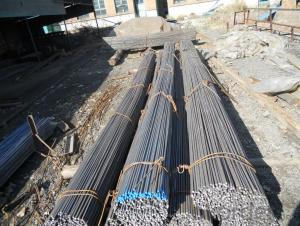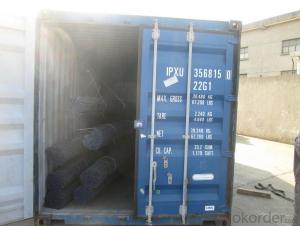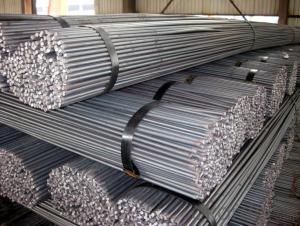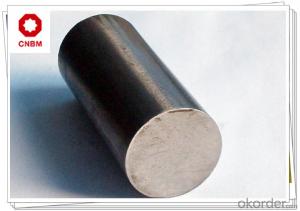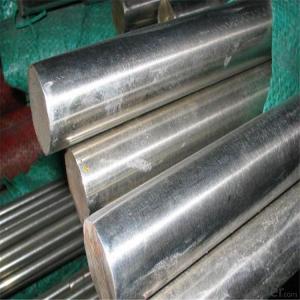SS400 and S235JR Steel Round Bar Products
- Loading Port:
- Tianjin
- Payment Terms:
- TT or LC
- Min Order Qty:
- 25 m.t.
- Supply Capability:
- 7000 m.t./month
OKorder Service Pledge
OKorder Financial Service
You Might Also Like
Product Description:
OKorder is offering SS400 and S235JR Steel Round Bar Products with worldwide shipping. Our supplier is a world-class manufacturer of steel, with our products utilized the world over. OKorder annually supplies products to European, North American and Asian markets. We provide quotations within 24 hours of receiving an inquiry and guarantee competitive prices.
Product Applications:
SS400 and S235JR Steel Round Bar Products are ideal for structural applications and are widely used in the construction of buildings and bridges, and the manufacturing, petrochemical, and transportation industries.
Product Advantages:
OKorder's SS400 and S235JR Steel Round Bar Products are durable, strong, and resist corrosion.
Main Product Features:
· Premium quality
· Prompt delivery & seaworthy packing (30 days after receiving deposit)
· Corrosion resistance
· Can be recycled and reused
· Mill test certification
· Professional Service
· Competitive pricing
Product Description:
Specifications of Steel Round Bar Products
1. Grade: Q235, A36, SS400, S235JR
2. Feature: Unbreakable, grinding resistant and high impact value
3. Diameter: 8mm-150mm
4. Performance: Mainly for civil construction
5. Characteristics: Even hardness, no deformation, no breaking, no mal-roundness
6. Technique: Hot rolled
7. Mass: Mass (kg/m) = Diameter (mm) × Diameter (mm) × 0.00617
Usage and Applications of Steel Round Bar Products
1. Steel round bar products is used in construction and a large number of architectural and engineering structures. And it can be used in production of handrail, windows, machinery, telecom and curtain wall.
2. It can be used in the fields like metal mines, cement plants, water coal slurry, power stations and chemical industry.
3. Besides, we can supply some especial material steel round bar that can be used for main shaft of steamer, hummer shank, with big section and supper force.
4. Recommended watchcase factory, screw factory and other cold stamping products industry use.
Packaging & Delivery of Steel Round Bar Products
Packaging Detail: All goods are packed in bundle with steel strips and shipped by break bulk vessel or container (depend on target market and different ports)
Delivery Detail: 45 days
Trade terms: FOB, CFR, CIF
MOQ: 25 tons per specification; we can negotiate the quantity if the specification is normal or we have stock of one specification.
Weight: The price invoicing on theoretical weight basis or actual weight basis depends on customer’s request.
Shipment: The shipment of bulk break or container is depends on customer’s request and the situation of the port of destination.
Documents given: Full set of original clean on board bill of lading; Original signed commercial invoice; Original packing list; Policy of insurance; Certificate of origin and what the target market needs.
Production Flow of Steel Round Bar Products
Material prepare (billet) — heat up — rough rolling — precision rolling — cooling — packing — storage and transportation
Characteristics of Steel Round Bar Products
1. The steel in which the main interstitial alloying constituent is carbon in the range of 0.12–2.0%.
2. As the carbon percentage content rises, steel has the ability to become harder and stronger through heat treating; however it becomes less ductile.
3. Regardless of the heat treatment, higher carbon content reduces weld ability. In carbon steels, the higher carbon content lowers the melting point.
4. Quality should be in conformity with the specification of the manufacturer. Quantity and packing conditions should be in conformity with the term in the contract.
FAQ:
Q1: Why buy Materials & Equipment from OKorder.com?
A1: All products offered byOKorder.com are carefully selected from China's most reliable manufacturing enterprises. Through its ISO certifications, OKorder.com adheres to the highest standards and a commitment to supply chain safety and customer satisfaction.
Q2: How do we guarantee the quality of our products?
A2: We have established an advanced quality management system which conducts strict quality tests at every step, from raw materials to the final product. At the same time, we provide extensive follow-up service assurances as required.
Q3: How soon can we receive the product after purchase?
A3: Within three days of placing an order, we will begin production. The specific shipping date is dependent upon international and government factors, but is typically 7 to 10 workdays.
Images:
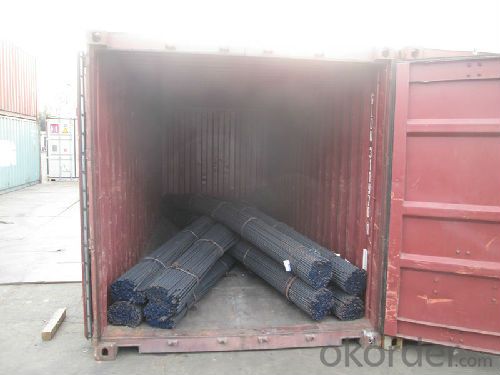
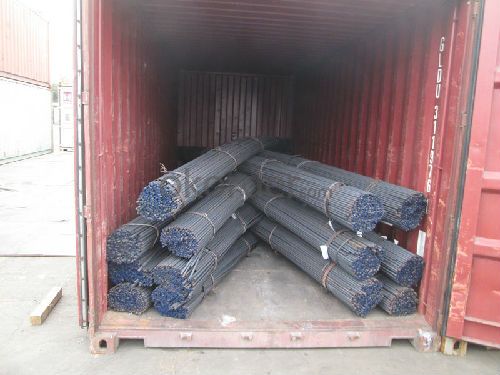
- Q: Are steel round bars corrosion-resistant?
- Yes, steel round bars can be corrosion-resistant depending on the type of steel used and any additional protective coatings or treatments applied.
- Q: What are the advantages of using nickel-manganese alloy steel round bars?
- Nickel-manganese alloy steel round bars provide numerous benefits in various applications. To begin with, these round bars exhibit exceptional strength and toughness. The incorporation of nickel and manganese significantly enhances the overall strength and durability of the steel, rendering it suitable for heavy-duty applications that demand high strength and resistance to wear and tear. As a result, industries such as construction, automotive, and manufacturing find these alloy steel round bars highly advantageous. Additionally, nickel-manganese alloy steel round bars possess outstanding corrosion resistance properties. The nickel content in the alloy imparts remarkable resistance to corrosion, making it ideal for use in harsh environments or situations where exposure to corrosive substances is common. Consequently, the lifespan of these round bars is extended, reducing the need for frequent maintenance or replacement. Moreover, these round bars demonstrate excellent heat resistance. They can withstand elevated temperatures without compromising their structural integrity, making them suitable for applications involving extreme heat or thermal cycles. Industries like aerospace, power generation, and oil and gas greatly benefit from this heat resistance property. Furthermore, nickel-manganese alloy steel round bars offer favorable weldability and machinability. The composition of the alloy facilitates easy welding and machining, allowing manufacturers to fabricate components or structures with ease. This versatility in processing makes the round bars highly adaptable to varying manufacturing processes and requirements. Moreover, these round bars exhibit good ductility and formability. The alloy's composition permits easy shaping or forming into various configurations without sacrificing its structural integrity. Consequently, they are suitable for applications that necessitate complex shapes or intricate designs. In conclusion, the advantages of utilizing nickel-manganese alloy steel round bars encompass exceptional strength, corrosion resistance, heat resistance, weldability, machinability, and formability. These properties make these round bars a dependable and versatile choice for a broad range of applications across different industries.
- Q: What is the difference between a hot rolled and a turned steel round bar?
- The main difference between a hot rolled and a turned steel round bar lies in the manufacturing process and the resulting characteristics of the finished product. A hot rolled steel round bar is produced by heating a billet or ingot of steel to a high temperature and then rolling it into the desired shape. This process allows for the steel to be formed and shaped easily, resulting in a bar with a rough surface and a slightly rounded or irregular shape. Hot rolling also helps to improve the overall strength and toughness of the steel, making it suitable for a wide range of applications. On the other hand, a turned steel round bar is produced by machining a hot rolled or cold drawn bar on a lathe. This process involves removing material from the surface of the bar using cutting tools, resulting in a smooth and precise finish. Turning also allows for greater dimensional accuracy and control over the final shape and size of the bar. In terms of surface finish and dimensional accuracy, a turned steel round bar generally offers a higher level of precision compared to a hot rolled bar. The turned bar has a smoother surface with fewer imperfections, making it ideal for applications where appearance and aesthetics are important. Additionally, the turned bar typically has tighter tolerances, ensuring consistent dimensions throughout its length. The choice between a hot rolled and a turned steel round bar depends on the specific requirements of the application. Hot rolled bars are commonly used in construction, manufacturing, and general engineering applications where strength and toughness are crucial. Turned bars, on the other hand, are often used in industries such as automotive, aerospace, and precision machining, where a high level of surface finish and dimensional accuracy is required. In summary, the difference between a hot rolled and a turned steel round bar lies in the manufacturing process and the resulting characteristics. Hot rolled bars offer strength and toughness, while turned bars provide a smoother surface finish and greater dimensional accuracy. The choice depends on the specific needs of the application.
- Q: What are the different types of steel round bars used in the power generation industry?
- In the power generation industry, there are various types of steel round bars utilized depending on specific requirements. Some common types include carbon steel round bars, stainless steel round bars, and alloy steel round bars. Carbon steel round bars are often used for their high strength and durability, while stainless steel round bars are favored for their corrosion resistance. Alloy steel round bars, on the other hand, offer a combination of strength, toughness, and heat resistance, making them suitable for demanding power generation applications.
- Q: Can steel round bars be annealed?
- Yes, steel round bars can be annealed. Annealing is a heat treatment process that involves heating the steel to a specific temperature and then gradually cooling it, which helps to relieve internal stress, improve ductility, and enhance the material's machinability.
- Q: Can steel round bars be coated?
- Yes, steel round bars can be coated. Coating steel round bars provides several benefits, including improved corrosion resistance, enhanced durability, and increased aesthetic appeal. The most common types of coatings for steel round bars include galvanized coatings, epoxy coatings, and powder coatings. Galvanized coatings involve the application of a layer of zinc to the surface of the steel, which provides excellent corrosion protection. Epoxy coatings are typically used for industrial applications as they offer superior chemical resistance and can withstand harsh environments. Powder coatings involve the application of a dry powder electrostatically, which is then cured under heat to form a hard, protective layer. These coatings can be applied to steel round bars to protect them from rust and other forms of corrosion, making them suitable for a wide range of applications in various industries such as construction, manufacturing, and automotive.
- Q: What is the typical lead time for manufacturing steel round bars?
- The lead time for manufacturing steel round bars can vary depending on different factors, including the bars' size and quantity, the complexity of the manufacturing process, and the manufacturer's production capacity. Typically, manufacturing steel round bars takes anywhere from a few days to several weeks. When it comes to standard sizes and quantities, the lead time is usually shorter since manufacturers keep them in stock. However, custom orders or larger quantities require additional processes such as sourcing raw materials, cutting, heat treating, and quality control checks, which can extend the lead time. It's important to consider that market demand and the manufacturer's production schedule can also impact lead times. During periods of high demand or limited production capacity, lead times may be longer. Conversely, during times of low demand or surplus production capacity, lead times can be shorter. To get an accurate estimate of the lead time for manufacturing steel round bars, it is recommended to directly contact specific manufacturers or suppliers. They will be able to provide more precise information based on their capabilities and current workload.
- Q: What are the different types of steel round bar coatings used in the automotive industry?
- In the automotive industry, various coatings are commonly applied to steel round bars to enhance their durability, corrosion resistance, and overall performance. Here are some examples: 1. Galvanized Coating: Widely utilized in automotive applications, this coating involves the application of a zinc layer to the steel bar's surface. Galvanized coating provides excellent protection against corrosion, safeguarding the steel from rust and other forms of degradation. 2. Epoxy Coating: This coating is preferred when high chemical resistance is required in automotive applications. It forms a protective barrier against chemicals, moisture, and other corrosive substances. Additionally, epoxy coatings exhibit exceptional adhesion properties, ensuring long-lasting performance. 3. Powder Coating: Known for durability and aesthetic appeal, powder coating is a popular choice for steel round bars in the automotive industry. It involves the application of dry powder to the steel bar's surface, which is then heated, creating a tough and protective layer. Powder coatings offer a wide range of colors and finishes, allowing for customization and branding opportunities. 4. Ceramic Coating: Ideal for automotive applications involving high temperatures, ceramic coatings provide exceptional heat resistance. They form a protective barrier that prevents heat damage and extends the lifespan of steel round bars. 5. Phosphate Coating: Often used as a pre-treatment before applying other coatings, phosphate coatings enhance adhesion and provide additional corrosion resistance. They also improve the lubricity of the steel bar, reducing friction and wear. These examples demonstrate the variety of steel round bar coatings used in the automotive industry. Each coating offers unique benefits and is selected based on specific application requirements. Ultimately, these coatings play a vital role in improving the performance and longevity of steel round bars in automotive applications.
- Q: Can steel round bars be used in the production of springs?
- Yes, steel round bars can be used in the production of springs. Steel round bars are commonly used as raw materials for manufacturing various types of springs due to their strength, durability, and high tensile properties. They can be machined or cold-formed into the desired shape, providing the necessary flexibility and resilience required for spring applications.
- Q: How are steel round bars used in the manufacturing of agricultural machinery?
- Steel round bars are commonly used in the manufacturing of agricultural machinery as they provide strength, durability, and flexibility. These bars are often used to construct various components such as axles, shafts, and pins, which play a crucial role in supporting and transmitting power within the machinery. The high tensile strength of steel round bars allows them to handle heavy loads and withstand harsh operating conditions, ensuring the reliability and longevity of the agricultural equipment.
Send your message to us
SS400 and S235JR Steel Round Bar Products
- Loading Port:
- Tianjin
- Payment Terms:
- TT or LC
- Min Order Qty:
- 25 m.t.
- Supply Capability:
- 7000 m.t./month
OKorder Service Pledge
OKorder Financial Service
Similar products
Hot products
Hot Searches
Related keywords
